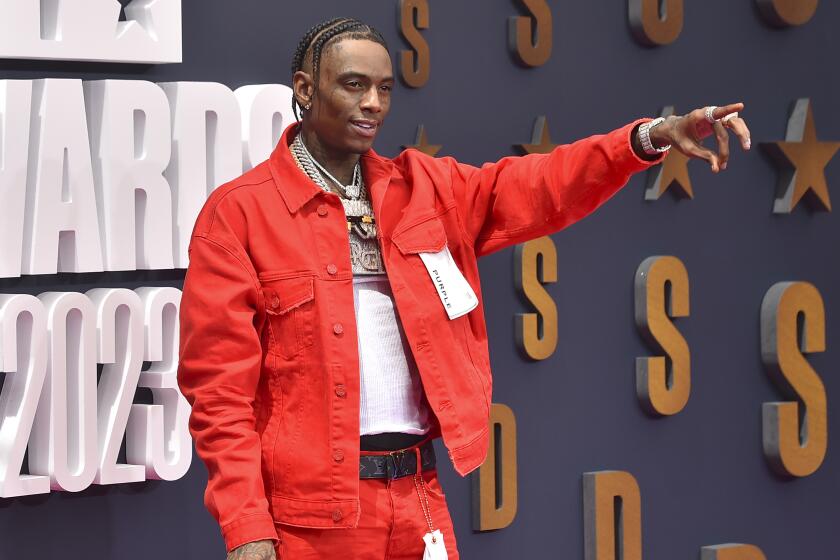Extraordinary Sounds : Emil Richards’ unusual instruments, made from objects such as nuts and bolts, are used in hundreds of film soundtracks.
- Share via
BURBANK — Spoons slapped together against a cheek, the banging and clonging of wind chimes made of wrenches, the seductive rattling that emanates from angklungs from Bali, the resonant roar of Eskimo rim drums that are whapped on the edges--these are just a few of the sounds that Emil Richards loves.
For more than 30 years, the mallet-player-percussionist has used his travels around the world with the likes of Frank Sinatra and George Harrison to collect unusual ethnic instruments. Additionally, Richards, 61, relishes making instruments from found objects, such as his wrench and nuts and bolts wind chimes. He figures he’s either accumulated or made about 650 instruments and has used them on the soundtracks of hundreds of films, from “Hatari” in the ‘60s to “The Shadow” in the ‘90s.
“Composers like to use the instruments, because they stand out, creating a funny or scary sound,” says Richards, who lives in Toluca Lake. “They’re always calling me, asking me, ‘What have you got that’s new?’ And when I tell them, they say, ‘Hey, I want to use that.’ ”
Richards used two ethnic instruments for Jerry Goldsmith’s score to Russell Mulcahy’s “The Shadow,” which stars Alec Baldwin and opens today nationwide. “I made some real low, boomy sounds, using large Daiko drums from Japan and mixing them with the angklungs, which are tuned bamboo rattles,” says Richards.
Like many top-flight studio players, the percussionist finds a refreshing balm in playing jazz. “Be-bop is still my first love,” he says adamantly. He gets out to play jazz about once a month, and will lead his quartet Wednesday at Chadney’s.
Richards is candid about the reason he doesn’t play more often: There’s not enough pay in jazz, and he says he is one of the causes of this situation.
“You can’t make a living playing jazz,” he starts. “Years ago, when jazz players started working in the studios, they wanted to get their kicks playing jazz, so they did it for very low pay, since they weren’t concerned about making a living.” That established a pattern of keeping pay for club work at a minimal level, Richards says. “The studio players did it.”
*
Still, Richards has had a lengthy career as a jazzman. He first came to public attention as part of a quintet led by reed man Paul Horn in the late ‘50s, then in the ‘60s played with trumpeter Don Ellis’ Hindustani Jazz Sextet, and his own Microtonal Blues Band. In the ‘70s, he was part of Roger Kellaway’s Cello Quartet, and in the late ‘80s, decided to reform his own band. He’s was recently reunited with Kellaway, appearing on the pianist’s new album, “Windows: Music for Cello and Jazz Quintet” on Angel Records.
At Chadney’s, Richards plays with drummer Joe Porcaro, pianist Dave MacKay and bassist Ken Wild. In many ways, it’s like going back home.
“I’ve known Joe since I was 6, when I started to play xylophone,” says Richards, who was born and raised in Hartford, Conn. “He lived right up the street. And I met Dave when I was 14, and we started playing together. We lied about our ages so we could work in the clubs.”
The fellows performed together until they were in their early 20s, then went separate directions. When they all found themselves living in Southern California in the mid-’60s, they began to play again, first as part of Ellis’ band, then with the Microtonal Blues Band.
At that time, they were all fascinated with what are known as odd-time signatures. Jazz is most often played in 4/4 meter, which is used for swing rhythm, the kind that makes you pat your foot, and 3/4--the waltz. But Richards found a new flavor in such time signatures as 7/4, 9/8 and 3/2, which give pieces a jaunty angularity.
The patrons at Chadney’s go for Richards’ stuff in a big way, says Dennis Duke, who books the room. “The band sounds great, it always get a good turnout and the crowds are very enthusiastic,” he says.
As for his fascination with unusual instruments, Richards says that will never change. “Looking for something new is like being a kid,” he says. “You never have to grow old.”
WHERE AND WHEN
Who: Emil Richards’ quartet.
Location: Chadney’s, 3000 W. Olive St., Burbank.
Hours: 9 p.m. to 1 a.m. Wednesday.
Price: No cover, no minimum.
Call: (818) 843-5333.
More to Read
The biggest entertainment stories
Get our big stories about Hollywood, film, television, music, arts, culture and more right in your inbox as soon as they publish.
You may occasionally receive promotional content from the Los Angeles Times.










